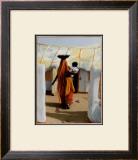The Indian Minister of Justice, Veerappa Moily, said the government had banned the publication of new book on Gandhi, Great Soul: Mahatma Gandhi And His Struggle With India [A great soul: Mahatma Gandhi and his struggle with India ]. Such a decision is justified by neither the facts nor the law nor by common sense.
This threat is at best the result of a totally erroneous reading of the book - the content has been portrayed by Moily as "heresy" - and, at worst, the result not of a reading, but the impact reviews published in some Western media criticism quite misleading [the AFP, or the British newspapers Daily Mail and The Daily Telegraph insist on the supposed bisexuality of Gandhi, in view of its intimate relationship with his friend Hermann Kallenbach, German Jewish architect].
The biography, written by Joseph Lelyveld, a former journalist of The New York Times, does not argue that Mahatma Gandhi was bisexual, nor does it present it as a racist. In his meticulous analysis of the linkages between the beginnings of the political life of Gandhi in South Africa and its development in India, the book mentions his relationship with Hermann Kallenbach, a Prussian architect.
The powerful emotional connection between the two men, who lived together for a while Tolstoy Farm near Johannesburg, is also widely attested in the letters that Gandhi wrote to Kallenbach. Lelyveld mentions in his book specialist Gandhi that defines their relationship as "homoerotic" rather than "homosexual" interpretation that everyone is free to contest.
Anyway, it does not serve as a pretext for a ban on publication, as the Gujarat government was quick to do [the government of Maharashtra said it would do the same]. "I am a man of the earth, earthy ... I am as prone to many weaknesses you," said the now famous declaration of Mahatma. He heard the sound many of these shortcomings with a great honesty in his autobiography My Experiments with Truth.
Most publishers love the controversy of the kind that was triggered by a small part of a paragraph in the biography of Lelyveld. Some even go so far as to orchestrate. It was not so long ago, in Mohandas, written by his grand-son Rajmohan Gandhi, a brief episode in the life of the Mahatma - his relationship with Saraladevi Chaudharani, niece of Rabindranath Tagore "around which Eros person should prowl" - has generated media frenzy.
In accordance with paragraph 95 of the Penal Code, the authorities may ban books if they contain elements likely to disturb civil peace or to provoke sectarian tensions. Obviously this is not the case with Great Soul. The Supreme Court, which has consistently opposed the ambitions of the grossest censorship, has significantly limited the use of paragraph 95.
Just browse the references to the controversy of the Kindle edition to say that Lelyveld has too emphasized apparently unreliable sources on the subject. The best response is the critically reasoned and informed criticism. The Mahatma was the first to protest against any form of censorship obscurantist. 


This threat is at best the result of a totally erroneous reading of the book - the content has been portrayed by Moily as "heresy" - and, at worst, the result not of a reading, but the impact reviews published in some Western media criticism quite misleading [the AFP, or the British newspapers Daily Mail and The Daily Telegraph insist on the supposed bisexuality of Gandhi, in view of its intimate relationship with his friend Hermann Kallenbach, German Jewish architect].
The biography, written by Joseph Lelyveld, a former journalist of The New York Times, does not argue that Mahatma Gandhi was bisexual, nor does it present it as a racist. In his meticulous analysis of the linkages between the beginnings of the political life of Gandhi in South Africa and its development in India, the book mentions his relationship with Hermann Kallenbach, a Prussian architect.
The powerful emotional connection between the two men, who lived together for a while Tolstoy Farm near Johannesburg, is also widely attested in the letters that Gandhi wrote to Kallenbach. Lelyveld mentions in his book specialist Gandhi that defines their relationship as "homoerotic" rather than "homosexual" interpretation that everyone is free to contest.
Anyway, it does not serve as a pretext for a ban on publication, as the Gujarat government was quick to do [the government of Maharashtra said it would do the same]. "I am a man of the earth, earthy ... I am as prone to many weaknesses you," said the now famous declaration of Mahatma. He heard the sound many of these shortcomings with a great honesty in his autobiography My Experiments with Truth.
Most publishers love the controversy of the kind that was triggered by a small part of a paragraph in the biography of Lelyveld. Some even go so far as to orchestrate. It was not so long ago, in Mohandas, written by his grand-son Rajmohan Gandhi, a brief episode in the life of the Mahatma - his relationship with Saraladevi Chaudharani, niece of Rabindranath Tagore "around which Eros person should prowl" - has generated media frenzy.
In accordance with paragraph 95 of the Penal Code, the authorities may ban books if they contain elements likely to disturb civil peace or to provoke sectarian tensions. Obviously this is not the case with Great Soul. The Supreme Court, which has consistently opposed the ambitions of the grossest censorship, has significantly limited the use of paragraph 95.
Just browse the references to the controversy of the Kindle edition to say that Lelyveld has too emphasized apparently unreliable sources on the subject. The best response is the critically reasoned and informed criticism. The Mahatma was the first to protest against any form of censorship obscurantist.



No comments:
Post a Comment